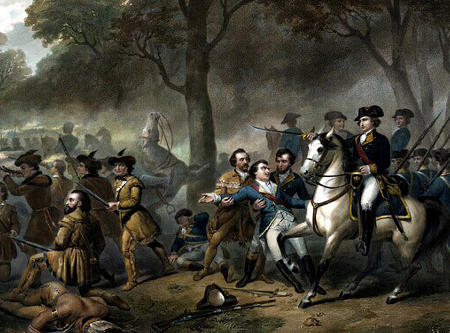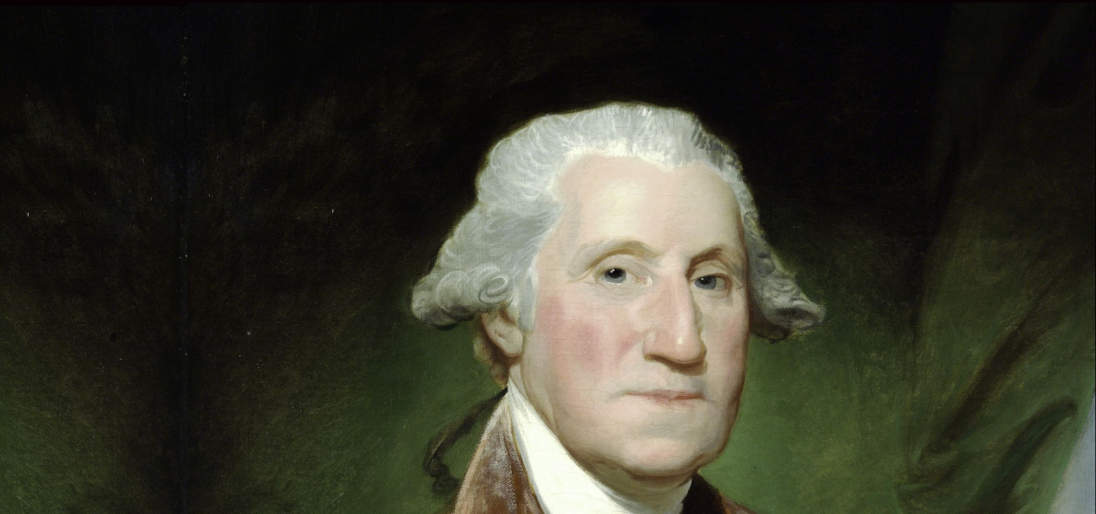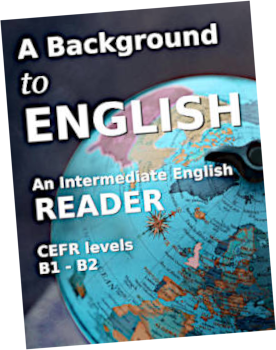An intermediate
level English resource.
WITH
AUDIO ►:
Click
to open/close audio playerAll
Americans know about George Washington. He was the first
president of the United States of America, and his face appears on the
iconic one dollar bill. He has also given his name to the
capital
city of the USA, Washington D.C, .... and to a state, the state of
Washington. No other American is quite so famous !
This document,
with exercises and answers, is included
in A Background to English,
a collection of 27 B1 - mid-B2 intermediate English reading
texts, with
exercises and answers, available from Amazon
worldwide, and leading
bookstores, including Barnes & Noble in the USA
and Waterstones in the UK.
An unforgettable president ...

George
Washington's portrait is on the iconic one dollar bill
After all, in 1789, he was elected the first president of the United States, a country that was to become the most powerful in the world. At the end of his life, in 1799, George was an international hero.
But, if you look back into George's early years, you will see that things were not always so rosy. George was sent into the Army as a very young man. For a colonist of his generation, it was a respectable thing to do. It gave him an opportunity to make a living, and at the same time see the country, which at the time was full of wild animals and Indians. It was a tough life, but an interesting one. One could hunt forever in the vast forests. One could explore new lands seemingly forever.
A lover of Nature, George became a surveyor with the Army, a job which led him further and further into the wild, unknown country. As for the Indians, they were generally friendly, and were good trading partners. All in all, George's young years were full of carefree wandering in a new, virgin land.

George
Washington rides to battle in the French & Indian war
In his quest to get the land beyond the mountains, the governor called upon his best soldier to deal with the situation: it was young George Washington, barely 22 years old at the time. The governor told George to go and find the French, and give them a simple message: leave the region immediately, or get ready for battle.
Wanting to serve and please his authorities, George did as he was told. He went over the mountains with a small army, found the French, and passed on the governor's message. But, of course, the French did not wish to leave. Inevitably, the conflict developed into a war, known as the French and Indian War; that is, the French and some Indian allies fighting the British colonials.
For George, it was a difficult time. To cut a long story short, it was the only time in his life that he had to surrender an army — at Fort Necessity, near the forks of the Ohio. In that battle, George nearly didn't become the first president of the United States. His army was surrounded by the French and Indians, badly outnumbered, so he had to surrender the fort. Luckily for him, the French allowed him and his army to leave with their horses and guns. The battle had been lost, but the English, who were more numerous, eventually won the war.
The French and Indian War was a learning experience for George, one that he would later exploit in the War for American Independence. Indeed, twenty years later, George was dressed in an American uniform, and fighting not against the French, but against the British.
In this war, it is said that George's fiery leadership inspired his American troops when they were starving and cold, and he emerged from the war as the greatest general.
It was no surprise that the victorious Americans chose him as their first president. As for getting his picture on the dollar bill, that didn't come until after George was long dead and gone, proving that his spirit was truly an unforgettable one.
WORDS:
sum up: to give a brief review or summary -
rosy: nice - colonist : (in the USA at
the time) a man from England - make a living: make
enough
money to live - hunt : chase wild animals - seemingly:
apparently -
surveyor: person who measures land - trading
partners: people with whom one buys and sells -
carefree: casual, with no worries or responsibilities
- threatening news: news of danger - quest: attempt
- deal with: confront, handle -to cut a long story
short: in short - forks of the Ohio: place
where the Ohio river begins, from two other rivers -
outnumbered: having many less men than the enemy -
fiery: strongly emotional - starving: without
food Return to
Linguapress site index
► More American history texts: Gettysburg (Advanced) - Ellis Island (Advanced) - Martin Luther King (Advanced) - Rosa Parks (Advanced) - Thanksgiving (Advanced) - Buffalo Bill (Intermediate)
► More American history texts: Gettysburg (Advanced) - Ellis Island (Advanced) - Martin Luther King (Advanced) - Rosa Parks (Advanced) - Thanksgiving (Advanced) - Buffalo Bill (Intermediate)
Printing: Optimized for printing
Copyright © Linguapress. Do not copy this document to any other website
Copying permitted for personal study, or by teachers for use with their students
Interactive Student Worksheet
To save a completed worksheet that has been filled in on a computer or phone, use the print or print to file option of your browser after the answers have been written, and print or save the pages required – or else take (and save) a screenshot.Exercises:
1. Select the nearest equivalent to these expressions which occur in the text .
1.
was to become
-
2. claimed all land -
3. passed on the governor's message -
4. nearly didn't become the first president -
5. was a learning experience -
2. claimed all land -
3. passed on the governor's message -
4. nearly didn't become the first president -
5. was a learning experience -
2. Make up questions to which these are the answers, using the question word indicated.
- In 1799 .
- French soldiers .
- Because he wanted it too.
- To give them a simple message.
- The French and the Indians.
- At Fort Necessity.
- With his fiery leadership.
- Much later long after his death.
Answers.
Answers to exercise 1 and suggested answers for exercise 2 can be found
in the answers section of A Background to English,
the new paperback "best of" B1-B2 intermediate texts from
Linguapress.
As well as answers, this collection of 27 texts includes some texts not
available online, and access to more audio
recordings.
For teachers
Language:The passive: Get students to think up sentences about George Washington using the passive voice. There are several examples in the article, for example : he was elected the first president of the United States, George was sent into the Army as a very young man.
Reading for information :
Ask students to pick out as many words and phrases as possible that tell us what sort of a man George Washington was.
This
teaching
resource
is ©
copyright Linguapress renewed 2024.
Text revised from on an article originally published in
Freeway,
the intermediate level
English
newsmagazine. Republication on other websites or in print is not
authorised
| Linguapress; home | Découvrez l'Angleterre (en français) | Discover Britain |
Other ideas?
EFL teachers: Help develop this resource by contributing extra teaching materials or exercises.
To contribute click here for further details




